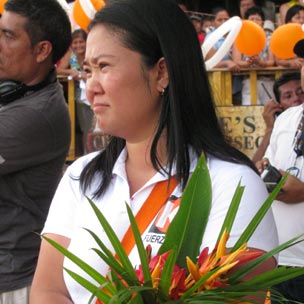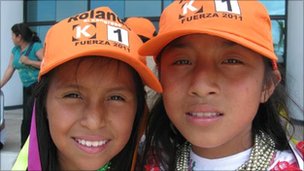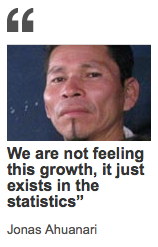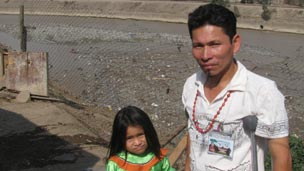
(above) Keiko Fujimori promises to maintain Peru's market-friendly model
Peruvians choose between their wallets and consciences
June 1, 2011 - BBC News
By Dan Collyns BBC News, Lima
Ask a Lima taxi driver how he will vote in the Peruvian elections this Sunday and he might, with a world-weary sigh, characterise the dilemma as choosing between your wallet and your conscience.
Thinking of your wallet means voting for Keiko Fujimori, daughter of the former President Alberto Fujimori who is serving a 25-year stretch for corruption and links to death squads.
She promises to maintain Peru's market-friendly model, which has made it one of the world's fastest growing economies, but critics say she could repeat the sins of the father.
Keiko Fujimori's last name, for many Peruvians, is synonymous with the destruction of democratic institutions, systemic corruption and a murderous counter-insurgency against Maoist Shining Path guerrillas in the 1990s.
Chavez links
Voting with your conscience would mean voting for Ollanta Humala, a former army officer who calls himself a nationalist.
Mr Humala does not have perfect democratic credentials. Charges shelved for lack of evidence alleged that as an army major he oversaw the disappearance of civilians in the same 1990s conflict.
A fortnight before the election he swore on a Bible to respect human rights and the constitution, but it has been harder for Mr Humala to dispel the memories of his former incarnation as a protege of the Venezuelan leader, Hugo Chavez.
President Chavez's wholesale nationalisation of Venezuela's economy terrifies the architects of Peru's economy, which has boasted the highest growth and lowest inflation in the region.
Despite his repeated pledges to respect private investment and keep macroeconomic policies in place if elected, Mr Humala has been vilified by a largely partisan media.
In moving to the centre, he has tried to recast himself in the Brazilian social democratic mould.
He has also revised his party's manifesto several times, but his detractors say his ascendance in an opinion poll triggered a 20% plunge in Lima's stock exchange.
(below) Supporters of Keiko Fujimori's party wear distinctive orange baseball caps

The former head of Peru's central bank, Jorge Chavez, is among those who does not trust Mr Humala.
"He is changing all the time - his team, his economic fundamentals. His proposal is not clear and he lacks credibility with economic agents," he tells the BBC.
'Malicious lies'
Mr Chavez, now executive president of Maximixe, a financial consultancy, says economists are already revising down the growth rate in anticipation of a possible victory by Mr Humala.
But Felix Jimenez, the chief economist on Mr Humala's campaign team, says their proposals favour a market economy and statements to the contrary are just "malicious lies".
"There's an unfounded fear of change for a certain political-economic sector. There's a desire to maintain their privileges which has led them to twist our proposals", he says.
"They accuse us of wanting to nationalise, expropriate, to go back to the past, but that's not true. We want to make the transformation from being a welfare state to a developing country."
 But Keiko Fujimori, whose father is credited by many with beating hyperinflation and establishing Peru's market economy, has also capitalised on Mr Humala's changeability, telling the BBC: "Businessmen trust my political plan because I have just one. My opponent has four, so there's a lot of inconsistencies and he's not generating trust."
But Keiko Fujimori, whose father is credited by many with beating hyperinflation and establishing Peru's market economy, has also capitalised on Mr Humala's changeability, telling the BBC: "Businessmen trust my political plan because I have just one. My opponent has four, so there's a lot of inconsistencies and he's not generating trust."
Inequality remains
There is a clear polarisation in the tightly contested electoral race. Most middle- and upper-class voters, particularly in Lima, favour Keiko Fujimori, while Mr Humala has solid support in the country's southern Andes and jungle.
Official figures show poverty has dropped by more than 20% in the past decade in Peru.
Unprecedented growth has boosted construction by 18% and vehicle sales by more than 50%, but the level of inequality between rich and poor remains almost unchanged.
Poverty, defined as living on less than $94 (£58) a month, is largely a rural phenomenon, affecting more than half of those living in the countryside and just 19% of urban dwellers.
Many of the poor in Lima, home to almost a third of the nation's population, are recent migrants from the country's interior.
(below) Jonas Ahuanari is sceptical about the country's economic growth

One of them Jonas Ahuanari, a native Shipibo from Peru's Amazon, who lives with his young family in a shack at the back of an ironmongers' market next to the city's filthy Rimac river, says: "Where is this economic growth we're talking about if in my village the children are still learning writing with their notebooks on their knees, sitting on the bare earth?"
"We are not feeling this growth, it just exists in the statistics."
Minerals make up more than 60% of Peru's exports and record-high commodity prices have strengthened the country's finances throughout the global recession.
But millions of Peruvians living in rural areas resent the presence of the extractive industries, which often pollute while providing little employment.
That resentment came to a head when 34 police and protesters were killed in June 2009 in Bagua, northern Peru, in a protest over Amazon land and resources.
"There's a high level of conflict in the country because this economic growth isn't reaching the poorest families," Mr Humala tells the BBC while on the campaign trail in Lima's sprawling Comas suburb.
"On the contrary, the more growth there is, the more conflict it generates. There are 250 social conflicts in the country today, which questions the way Peru is growing. We have to create more equality."
Raising taxes
For Carlos Monge, an investigator with the Peruvian Centre for the Promotion of Development, Mr Humala "represents the paradox of growth without economic and social inclusion for a large segment of the population".
Mr Humala wants to increase the taxes paid by mining companies, several of which are making record profits because of high commodity prices and demand from China.
But while he wants to impose windfall profit taxes to fund social programmes, his aides have not ruled out tax stability contracts for certain companies.
"In a less conservative country he could pass as a centre candidate and the word 'left' would be entirely left out," says Mr Monge.
The fact that two populist, even authoritarian, candidates from opposite ends of the political spectrum are now battling vote-for-vote after a decade of strong growth and mainstream democracy, responds to voters' desire for change - albeit moderate change. Some experts have called it a "protest vote".
But few nations can be more sceptical about political campaign proposals. Peruvians are used to being lied to and they have lived with the often disastrous consequences.